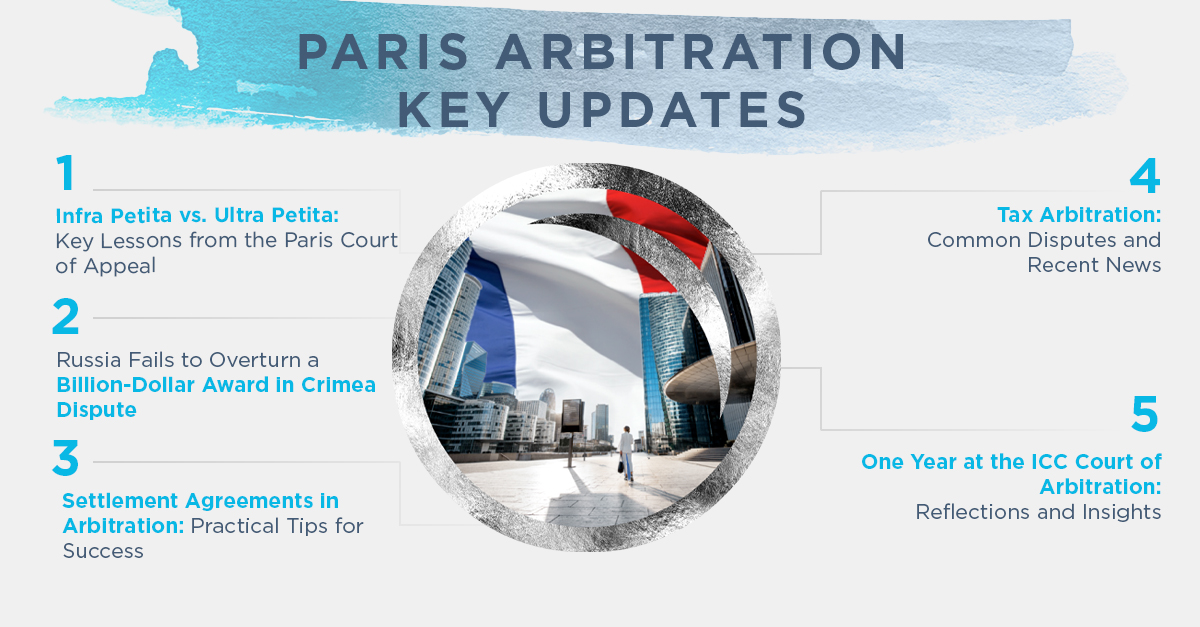Welcome to our latest update, focused on bringing you closer to the pulse of arbitration in Paris. In this edition we have curated key arbitration points that we believe are important for you:

LATEST FRENCH ARBITRATION CASE LAW
ARBITRATION & OMISSION TO RULE: On 3 June 2025, the Paris Court of Appeal ruled on whether or not an award can be annulled on the ground that the tribunal failed to address one of the parties’ claims (infra petita).
This case concerned a dispute over a franchise agreement between US-based Wingstop Franchising LLC and its French franchisees, B.Wing and Flight 83. The franchisees sought to annul an LCIA partial award on liability, alleging that the tribunal had failed to address their €8.8 million counterclaim for damages. After clarifying that a tribunal’s mandate “is primarily defined by the subject matter of the dispute, which is determined by the claims of the parties”, the Court rejected the franchisees’ claim by holding that the tribunal’s failure to rule on key legal consequences of Wingstop’s contractual breaches “even if established, cannot justify the annulment of the award, as an omission to rule does not constitute grounds for annulment”.
Takeaway? This decision reflects the French Courts’ approach to limiting annulment of awards based on infra petita. Parties must use procedural remedies, like requesting a supplementary award, to address such issues. In doing so, it further highlights the distinction between infra petita and ultra petita claims, with the latter more frequently leading to annulment under Article 1520(3) CPC.
(Read my analysis of the Court of Appeal’s decision here)
REGIONAL HIGHLIGHTS – Russia Fails to Invalidate Billion-Dollar Award in Crimea Investment Dispute
On 1 July 2025, the Paris Court of Appeal rendered a decision rejecting Russia’s objections to an arbitral tribunal’s jurisdiction under the 1998 Russia-Ukraine BIT in a case arising from the 2014 annexation of Crimea and highlighting the interplay between territorial disputes and investment treaty arbitration.
Here are the key aspects leading to this decision:
- Following the annexation of Crimea by Russia, Ukrainian state-owned Oschadbank initiated arbitration proceedings before the PCA (which Russia refused to participate in) under the 1998 Russia-Ukraine BIT, resulting in a US$1.1 billion arbitration award in its favour for the expropriation of its investments during the annexation,
- The Paris Court of Appeal initially annulled the award, finding the tribunal lacked jurisdiction. However, the French Court of Cassation overturned this decision and remanded the case to the Paris Court of Appeal,
- Russia raised three jurisdictional objections: (i) ratione temporis, arguing the BIT did not apply as Oschadbank’s investment predated its entry into force in 1992; (ii) ratione loci, claiming the BIT excluded Crimea due to its contested status; and (iii) ratione materiae, asserting the investments were not “foreign” as they were made by a Ukrainian entity within Ukraine,
- The Paris Court of Appeal rejected all three of Russia’s objections, finding that (i) the dispute arose after the BIT entered into force, (ii) territorial disputes over Crimea did not exclude it from the BIT’s scope, as the assets were located in a territory under Russian control following the 2014 annexation, and (iii) the BIT protects existing investments at the time of the dispute regardless of their creation date or past territorial changes,
- In April 2025, Oschadbank announced it had seized approximately €87 million worth of Russian property in France as part of its efforts to enforce the award.
(Read my analysis of the Paris Court of Appeal’s decision here)
PRACTICAL TIPS – Settlement Agreements in Arbitration
Settlement agreements are a valuable tool for resolving disputes efficiently and bringing the arbitration to an end. In practice, this can happen at any stage of the procedure and can be initiated by any party. It is never too late to settle! Settlement agreements often are a smart, strategic move that saves the parties time, costs, and the uncertainty of proceeding to a final award. Here are some practical information and tips that you need to keep in mind:
- Relevant arbitration rules: While arbitration institutions like LCIA, SIAC and HKIAC take a conservative view, the ICC Rules (Appendix IV.h) and CIETAC Arbitration Rules (Article 47), take a more proactive stance by empowering arbitral tribunals to actively encourage parties to consider settlement. The DIS Arbitration Rules go even further, obliging tribunals to discuss settlement possibilities with the parties (Article 26),
- Progressive approach to arbitration settlement: In 2023, the ICC reported that 364 out of 870 registered cases (42%) were withdrawn before a final award, with 90% of these withdrawals based on joint party requests or requests unopposed by the other party. The HKIAC reported an even higher proportion, with 57% of arbitrations concluded in 2023 being resolved through settlement,
- Tribunals’ role in facilitating settlement: Tribunals can encourage settlement discussions during case management conferences or midstream procedural hearings. They may also propose mediation windows or bifurcation of issues (e.g., liability and quantum) to create opportunities for settlement,
- Transparency and public interest concerns: Keep in mind that in investment arbitration, settlement agreements may raise concerns about accountability, particularly in cases involving public interest issues such as environmental or human rights claims. Tribunals may thus refuse to issue consent awards if they believe a settlement undermines third-party rights or public interest,
- Plan proactively for settlement: From the outset of arbitration, you should assess the feasibility of settlement and incorporate relevant mechanisms into the procedural timetable. Don’t be afraid to engage in early discussions with the tribunal and your opposing party about potential settlement windows or mediation opportunities,
- Keep it confidential: When engaging in settlement discussions with your opposing party, make sure to maintain confidentiality and ensure that the settlement process is well-documented in order to avoid future disputes over its terms,
- Forms of settlement agreement: You and your opposing party have the option to either settle the dispute through a mutual agreement (which will be enforced as a typical contract, subject to the relevant contract laws), or to have the arbitrators issue an award reflecting the terms of your settlement (a “consent award”, which will become enforceable like a regular arbitral award).
SECTORIAL NEWS – Arbitration in the Tax Sector
International tax disputes have recently grown in complexity and number. While taxation was traditionally viewed as being a sovereign matter and inarbitrable, this perspective has evolved, with arbitration being widely recognised as an effective mechanism for resolving tax disputes, ranging from double taxation to investment treaty claims.
- Typology of disputes: Tax arbitration encompasses disputes arising from transfer pricing adjustments (where tax authorities of two different countries disagree on the pricing of transactions between the related entities, such as a parent company and its subsidiary), controversies surrounding withholding taxes, disputes on retroactive tax assessments, etc.,
- Double taxation issues: Arbitration is also often employed to resolve disputes under Mutual Agreement Procedures (MAPs) in double taxation cases, where the same income is taxed by two jurisdictions – with the OECD and UN Model Tax Conventions providing frameworks for such arbitration. The 2017 EU Convention on elimination of double taxation was also specifically designed to introduce a procedure to eliminate double taxation in specific situations,
- Tax issues in investment treaty arbitration: Disputes further frequently arise under BITs when a host state’s tax measures are perceived as discriminatory, arbitrary, or tantamount to expropriation. Notable cases include:
- Yukos v. Russia – a $50 billion claim where Russia’s tax reassessment, fines and enforcement measures were deemed a pretext to bankrupt Yukos and expropriate its assets,
- Cairn v. India – where the tribunal found that India’s retroactive application of a 2012 tax amendment violated the FET standard as it lacked specific public purpose, and ordered India to pay Cairn US$1.2 billion in damages,
- Mobil v. Argentina – where an ICSID tribunal found that Argentina’s imposition of export duties on natural gas and the calculation of royalties based on duty-inclusive prices (taken in the face of the country’s 2001-2002 economic crisis) violated Mobil’s contractual rights under the umbrella clause of the Argentina-US BIT.
- Tax carve-outs: Certain investment treaties exclude taxation from their scope, while others, such as the Energy Charter Treaty (ECT), carve out exceptions for specific tax measures (ensuring that fiscal sovereignty is preserved), adding complexity to arbitration proceedings. Article 21 of the ETC however includes “clawback” provisions allowing certain protections, such as expropriation and discrimination, to apply under specific conditions (e.g., prior referral to competent tax authorities, bona fide taxation measures),
- Recent case law:
- On 30 May 2025, Australian company Woodside Energy initiated ICSID arbitration against Senegal under the Netherlands-Senegal BIT and a contractual agreement, challenging a retroactive tax assessment of US$72 million imposed by Senegal’s tax authority, in relation to the Sangomar deepwater oilfield project,
- On 8 May 2025, a divided ICSID tribunal upheld its jurisdiction over a long-running $1.1 billion retrospective tax claim brought by Dutch-registered Prime Energy (formerly a Shell subsidiary) against the Philippines, over the Malampaya gas project – and centred on whether royalties paid covered the consortium’s full tax obligations,
- Earlier this year, Companhia Brasileira de Distribuição (GPA), one of Brazil’s largest retailers, has filed an ICC arbitration claim against Casino Guichard-Perrachon (its former French controlling shareholder), seeking up to US$445 million in indemnification over alleged improper tax deductions for goodwill amortisation from 2007-2013.
BY THE WAY
This month marks one year since my appointment as a member of the ICC Court of Arbitration representing Romania. Over the past year, I have had the privilege of contributing to the Court’s work, which includes the review of all arbitral awards rendered by tribunals, the determination of challenges against arbitrators, and the resolution of various administrative matters. With 191 members, the Court operates in different formations, and in-house counsels have the unique opportunity to observe its deliberations during meetings.
This experience has been exceptionally enriching and rewarding. It has been a privilege to engage in the review of complex awards and challenges, participate in discussions with an internationally diverse group of arbitration practitioners – the other members of the Court – and witness the meticulous and hard work of the Secretariat behind the scenes. I look forward to continuing this remarkable journey in the year ahead!


